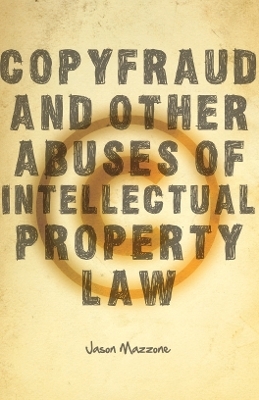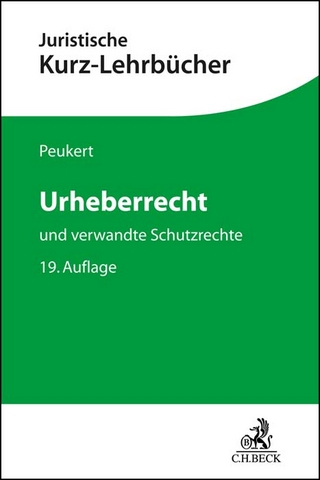
Copyfraud and Other Abuses of Intellectual Property Law
Seiten
2011
Stanford University Press (Verlag)
978-0-8047-6006-5 (ISBN)
Stanford University Press (Verlag)
978-0-8047-6006-5 (ISBN)
- Titel z.Zt. nicht lieferbar
- Versandkostenfrei innerhalb Deutschlands
- Auch auf Rechnung
- Verfügbarkeit in der Filiale vor Ort prüfen
- Artikel merken
From phony copyright notices attached to the U.S. Constitution to lawsuits designed to prevent people from poking fun at Barbie, overreaching claims of intellectual property rights are everywhere. Copyfraud and Other Abuses of Intellectual Property Law shows why overreaching occurs, how it harms consumers and undermines creativity, and how to stop it.
Intellectual property law in the United States does not work well and it needs to be reformed—but not for the reasons given by most critics. The issue is not that intellectual property rights are too easily obtained, too broad in scope, and too long in duration. Rather, the primary problem is overreaching by publishers, producers, artists, and others who abuse intellectual property law by claiming stronger rights than the law actually gives them. From copyfraud—like phony copyright notices attached to the U.S. Constitution—to lawsuits designed to prevent people from poking fun at Barbie, from controversies over digital sampling in hip-hop to Major League Baseball's ubiquitous restriction on sharing any "accounts and descriptions of this game," overreaching claims of intellectual property rights are everywhere.
Overreaching interferes with legitimate uses and reproduction of a wide variety of works, imposes enormous social and economic costs, and ultimately undermines creative endeavors. As this book reveals, the solution is not to change the scope or content of intellectual property rights, but to create mechanisms to prevent people asserting rights beyond those they legitimately possess.
While there are many other books on intellectual property, this is the first to examine overreaching as a distinct problem and to show how to solve it. Jason Mazzone makes a series of timely proposals by which government, organizations, and ordinary people can stand up to creators and content providers when they seek to grab more than the law gives them.
Intellectual property law in the United States does not work well and it needs to be reformed—but not for the reasons given by most critics. The issue is not that intellectual property rights are too easily obtained, too broad in scope, and too long in duration. Rather, the primary problem is overreaching by publishers, producers, artists, and others who abuse intellectual property law by claiming stronger rights than the law actually gives them. From copyfraud—like phony copyright notices attached to the U.S. Constitution—to lawsuits designed to prevent people from poking fun at Barbie, from controversies over digital sampling in hip-hop to Major League Baseball's ubiquitous restriction on sharing any "accounts and descriptions of this game," overreaching claims of intellectual property rights are everywhere.
Overreaching interferes with legitimate uses and reproduction of a wide variety of works, imposes enormous social and economic costs, and ultimately undermines creative endeavors. As this book reveals, the solution is not to change the scope or content of intellectual property rights, but to create mechanisms to prevent people asserting rights beyond those they legitimately possess.
While there are many other books on intellectual property, this is the first to examine overreaching as a distinct problem and to show how to solve it. Jason Mazzone makes a series of timely proposals by which government, organizations, and ordinary people can stand up to creators and content providers when they seek to grab more than the law gives them.
Jason Mazzone has taught intellectual property law and constitutional law at Brooklyn Law School since 2003; he is the youngest faculty member in the school's history to hold an endowed chair. A renowned legal scholar, Mazzone has written about legal issues for the New York Times and other national newspapers, and he is a regular media commentator and a blogger at the popular legal blog, Balkinization. He received his undergraduate and law degrees from Harvard University, a master's degree from Stanford University, and a master's and doctorate from Yale University. Before entering academia, he was a law clerk to two federal judges and he practiced intellectual property law in New York City.
| Verlagsort | Palo Alto |
|---|---|
| Sprache | englisch |
| Maße | 140 x 216 mm |
| Gewicht | 522 g |
| Themenwelt | Recht / Steuern ► EU / Internationales Recht |
| Recht / Steuern ► Öffentliches Recht | |
| Recht / Steuern ► Wirtschaftsrecht ► Urheberrecht | |
| ISBN-10 | 0-8047-6006-3 / 0804760063 |
| ISBN-13 | 978-0-8047-6006-5 / 9780804760065 |
| Zustand | Neuware |
| Haben Sie eine Frage zum Produkt? |
Mehr entdecken
aus dem Bereich
aus dem Bereich
Gesetz gegen den unlauteren Wettbewerb, Preisangabenverordnung, …
Buch | Softcover (2024)
dtv Verlagsgesellschaft
16,90 €
Textausgabe zum deutschen, europäischen und internationalen Patent-, …
Buch | Softcover (2023)
dtv Verlagsgesellschaft
17,90 €


